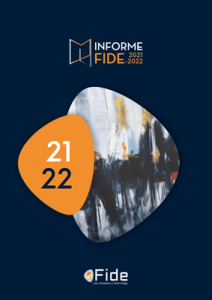
Labor News Forum
El Labor Forum of FIDE was born with a firm purpose of serving as a meeting point to bring together professionals in this discipline in order to be able to exchange ideas and opinions on the various topics of common interest and current affairs in the labor scene, which are defined for each academic year, in a The different perspectives of the speakers and participants can be heard, enriching the debate with the point of view, questions, opinions, advice and experiences that are freely contributed in each session.
Objectives 21-22
- The possible future new Statute of Workers
- Changes in the Regulating Law of Social Jurisdiction
- The role of the union in the future post-covid business landscape
- The impact of teleworking on the relationship between unions and the workforce
- Dismissal after ERTEs and fraudulent ERTEs
- The new regulation on Equality
- Recent issues regarding variable remuneration
- Reservation of documentation - business secrets
- The jurisprudential analysis of the Supreme Court
Ricardo Weddings
Anthony of the Source
Carlos de la Torre Garcia
Martin Godino Reyes
Jesus R. Mercader Uguina
Rosa Zarza
Publications
Discover all the publications, session summaries and other documents related to the activity of this forum:
22th October 2019
Speaker: Martín Godino Reyes, Managing Partner, Sagardoy Abogados
Moderator: Ricardo Bodas Martín, President of the Social Chamber of the National High Court. Member of the Academic Council of Fide
Summary:
The appearance and multiplication in recent years of activities that are organized through digital platforms and that put final consumers in contact with those who offer mass consumption services, has given rise to a type of work characterized by a relative autonomy of those who They lend it, compatible with a non-existent or precarious organization of material means to lend them. In this complex business scheme, the relationship between the owner of the platform or digital application and who, through it, effectively provides the service to the final consumer, is proving controversial in all legal systems, which has opened a debate on the legal nature of said relationship.
There are already some judicial pronouncements, intense administrative intervention and the formulation of doctrinal proposals to solve the controversy. Knowing it is undoubtedly of manifest importance for every jurist and in particular for the labor lawyer.
November 19th 2019
Speakers:
Jose Luis Piñar Mañas, Professor of Administrative Law, Universidad San Pablo CEU. Of Counsel, CMS Albiñana & Suárez de Lezo. Member of the Academic Council of Fide
Jesus R. Mercader Uguina, Professor of Labor Law at the Carlos III University of Madrid. Counsel of Uría Menéndez. Member of the Academic Council of Fide
Moderator: Carlos de la Torre Garcia, Of Counsel in the Labor Department of Baker & McKenzie SLP. Labor and Social Security Inspector (on leave of absence). Member of the Academic Council of Fide
Summary:
Next to the year of entry into force of Organic Law 3/2018, on Data Protection and Guarantee of Digital Rights, we consider it appropriate to make a global balance of its implementation and of the main issues that it has raised in recent months taking into account, in particular, the first interpretations made by the Spanish Data Protection Agency. On the other hand, the first judicial pronouncements issued by national and international courts (among which the recent pronouncement of the Grand Chamber in the López Ribalda case stands out), with regard to the application of digital rights, require reflection on the evolution of the norm in the practice of our labor relations and assess the effects that these nascent interpretative lines bring with them.
December 3th 2019
Speakers:
Maria Luisa Segoviano, Magistrate of Chamber IV of the Supreme Court
Rosa Viroles, Magistrate of Chamber IV of the Supreme Court
Moderator: Carlos de la Torre Garcia, Of Counsel in the Labor Department of Baker & McKenzie SLP. Labor and Social Security Inspector (on leave of absence). Member of the Academic Council of Fide
Summary:
During the session we had the opportunity to address current issues related to digital disconnection, privacy, use of digital devices, geolocation, recording of images and sounds, etc. The latest judgments handed down by both the Court of Justice of the European Union, the Court of Human Rights and the Fourth Chamber of the Supreme Court were examined.
February 6th 2020
Speaker: Carolina San Martin, Professor of Labor and Social Security Law at the Rey Juan Carlos University
Moderator: Ricardo Weddings Martin, Magistrate of the IV Chamber of the Supreme Court. Member of the Academic Council of FIDE
Summary:
Current redaction on this article. 34.8 ET reformulates the possibilities of adapting working time to make it compatible with family life. The precept offers guidelines, but it also raises unknowns, which the judicial bodies are beginning to face. He realized all of this in the session, in order to identify the applicable interpretive keys.
March 4th 2020
Speaker: Lourdes Arastey, Magistrate of the Social Chamber of the Supreme Court
Moderator: Martín Godino Reyes, Managing Partner of Sagardoy Abogados
Summary:
Fundamental rights that are not outside the protection framework of the Convention for the Protection of Human Rights and Fundamental Freedoms and its Protocols (ECHR). In this area, the possibilities of intervention of the European Court (ECHR) are particularly relevant insofar as its rules of procedure allow access by citizens themselves through individual claims against States bound by the ECHR. The latest pronouncements of the ECHR related to social issues -some of them related to our country- show the need to get closer to the procedural characteristics of this supranational instance.
Academic coordination: Victoria Dal Lago Demi












